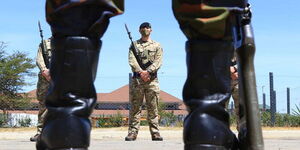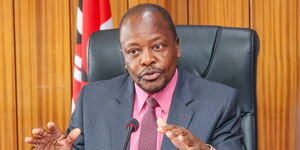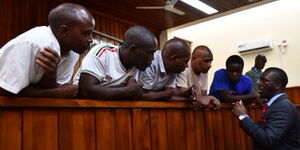The Ministry of Health has come under pressure to address the deteriorating state of Kenyatta National Hospital (KNH), which has been plagued by infrastructural and security issues in recent months.
Speaking to the Senate's Standing Committee on Energy on Thursday, September 25, Busia Senator Okiya Omtatah said that the Senate should urge the ministry to implement more measures to swiftly address these issues.
The senator said that the committee should present a report explaining why essential diagnostic and treatment services, including CT scans, dialysis and radiotherapy, are unavailable or defective.
Omtatah also said that the committee should outline the strategies put in place to ensure the maintenance and investment of hospital equipment, as well as the accountability mechanisms.
According to Omtatah, the hospital's deteriorating state has reached the point where patients are being referred to private hospitals for essential diagnostic services, which undermines its role as the national referral facility.
“Kenyatta National Hospital is expected to uphold the highest standards of healthcare, yet its current state is characterised by unhygienic conditions, overcrowded and poorly ventilated wards, long queues at essential service points, inadequate facilities for persons with disabilities, and lax security that has led to two murders within the wards in the last six months,” Omtatah said.
The committee should ensure accountability of the hospital's leadership and law enforcement, as well as strengthen the Ministry of Health's coordination with the Social Health Authority to ensure that services at the hospital and other referral hospitals across the country are seamless, according to Omtatah.
The announcement comes two months after Health Cabinet Secretary Aden Duale announced sweeping reforms at KNH and other referral hospitals, after two individuals were murdered inside the referral hospital in a span of six months.
Speaking during a visit to the hospital on Monday, July 28, the health boss said that CCTV cameras, limited patient visits, compulsory visitor screening, and routine safety checks were some of the mandatory reforms the hospitals were required to execute.
Duale also directed the hospitals to limit visitors to two per patient, implement anonymous feedback tools, and provide staff training on patients' rights and safety, in an effort to prevent such incidents from happening again.
The hospitals were also directed to form a close working relationship with the Ministry of Interior, Chiefs, and Community leaders to support abandoned patients in the hospitals.
The CS said that hospitals would be responsible for tracing families of abandoned patients, facilitating dignified discharges, and placing individuals in appropriate care institutions when reintegration is not possible.
“As a Ministry, we must safeguard the lives, rights, and dignity of all patients. We are committed to ensuring that such a tragedy does not happen again,” said CS Duale.
“As a Ministry, we must safeguard the lives, rights, and dignity of all patients. We are committed to ensuring that such a tragedy does not happen again,” said CS Duale.












